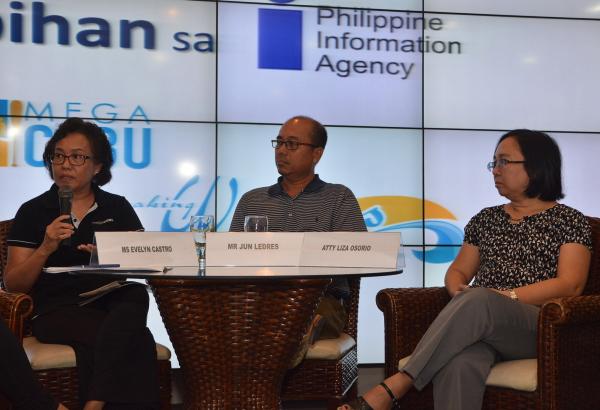Traffic management study planned for Mega Cebu

Evelyn Castro, executive director of the Ramon Aboitiz Foundation Inc. – Eduardo Aboitiz Development and Studies Center, discusses the road map for sustainable urban development in Metro Cebu in a forum. With her are Jun Ledres (center), assistant director of Neda-7, and lawyer Liza Osorio. (CDN PHOTO/ CHRISTIAN MANINGO)
A feasibility study on a proposed traffic management plan for Metro Cebu is set to be conducted next year, a representative of the Mega Cebu Development and Coordinating Board (MCDCB) said.
Evelyn Nacario Castro, executive director of the Ramon Aboitiz Foundation Inc.-Eduardo Aboitiz Developmental Studies Center (RAFI-EADSC), said on Thursday that MCDCB will not only be looking at area traffic control but also at urban transport and transit management.
“Ideally, we are looking at 2016 to start the studies,” she said during last Thursday’s weekly Kapihan sa PIA (Philippine Information Agency) forum held at RAFI-EADSC.
Castro also sits in the research, program and organization development (RPOD) unit of the MCDCB.
She said the undertakings, identified as flagship projects in the Mega Cebu roadmap study and due for implementation between 2015 and 2017, will be spearheaded by the Department of Transportation and Communication (DOTC) and the Department of Public Works and Highways (DPWH).
Castro said the study duration will depend on the subject matter, amount of existing information, and its scope.
The Mega Cebu road map for sustainable urban development in Metro Cebu, completed by the Japan International Cooperation Agency (JICA) in May this year, also identifies 14 anchor programs set to be implemented until 2030.
Among these are mass transit network development and integrated road traffic management programs.
Part of Mega Cebu’s short-term goals to improve mobility are the implementation of a Metro Cebu public transport system planning study, improvement of congested intersections, widening of sidewalks, and installation of bicycle lanes in line with road right of way (RROW) widening.
Also included are the implementation of the Cebu City Bus Rapid Transit (BRT) Project and the construction of a dual-mode bridge between Mandaue City and Mactan North.
While traffic has become a major problem in Metro Cebu lately and that there may be a need to hasten the implementation of these studies, Castro said it can’t be done that quickly.
“We are looking at problems that should have been solved yesterday. There have been institutions already to address these and if we look at issues on traffic, it’s really not that easy to solve,” she said.
Castro cited Mandaue City as an example, saying that there are many traffic issues in the area because there are several simultaneous road projects being implemented there.
“If I am not mistaken, there are nine road projects currently being implemented at the same time,” she added.
Since last Wednesday, the Mandaue City government has implemented a one-way scheme in some of its major roads in a bid to alleviate traffic congestion in the area.
Castro said these issues cannot be viewed purely from an “immediate” perspective.
“As much as we want things to be solved, we don’t have a magic wand,” she said.
That is why, Castro said, Mega Cebu is proposing to open up more roads, widen existing ones, and do geometric improvements to make it easier for vehicles to move.
The feasibility studies will be implemented in coordination with different agencies and organizations.
The component on road systems will be overseen by DOTC, while the road networks will be surpervised by DWPH.
“In fact, it’s not even limited to them. They have to consult with local government units as well,” said Castro.
While waiting for the implementation of these would-be solutions to traffic, MCDCB facilitates dialogues among concerned local chief executives.
“The local chief executives have already taken steps in relation to that,” said Castro.
Disclaimer: The comments uploaded on this site do not necessarily represent or reflect the views of management and owner of Cebudailynews. We reserve the right to exclude comments that we deem to be inconsistent with our editorial standards.




